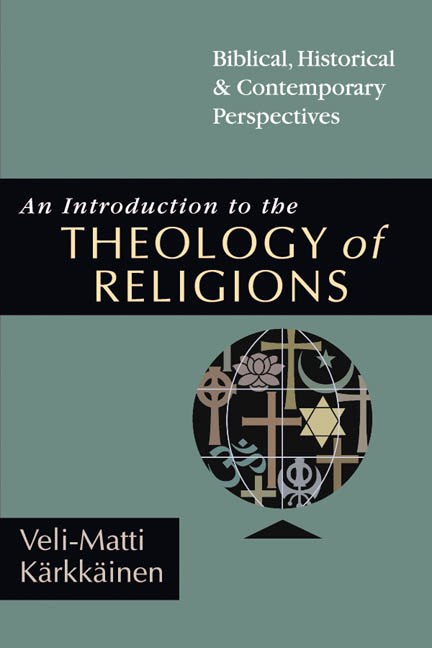Veli-Matti Karkkainen: An Introduction to Theology of Religions
 Veli-Matti Kärkkäinen, An Introduction to Theology of Religions: Biblical, Historical, & Contemporary Perspectives (Downers Grove: InterVarsity Press, 2003), 372 pages.
Veli-Matti Kärkkäinen, An Introduction to Theology of Religions: Biblical, Historical, & Contemporary Perspectives (Downers Grove: InterVarsity Press, 2003), 372 pages.
In a world where wars are waged over disagreements between world religions, widespread ignorance and indifference regarding theology of religions is an astounding and inexcusable reality. In this book Veli-Matti Kärkkäinen takes a bold step towards correcting this sad situation. Kärkkäinen, professor of systematic theology at Fuller Theological Seminary and a prolific author, is noted for insightful surveys and summaries of complex theological subjects (e.g., see his Pneumatology: The Holy Spirit in Ecumenical, International, and Contextual Perspective, Baker, 2002). His own Evangelical and Pentecostal background bring added depth and dimension to his writing which Pneuma Review readers will appreciate as well. In An Introduction to Theology of Religions he makes a tremendous amount of material more readily accessible and intelligible for readers. Key characters and concepts are introduced and investigated objectively. An extensive table of contents, detailed outline, full bibliography, and thorough author/subject indexes are helpful aids for readability and research. Anyone, whether pastor or teacher, student or scholar, interested in gaining a good working knowledge of one of the most challenging but stimulating fields of study among the theological disciplines will assuredly benefit from a reading of this book. It may be particularly well-adaptable as a college or seminary textbook.
Veli-Matti Kärkkäinen begins with an introduction explicating the nature and needs of the newly developing discipline of theology of religions, and adds practical advice on how to use this book. Then he tackles, as the subtitle suggests, biblical, historical, and contemporary perspectives on theology of religions, closing with a brief epilogue. Noting that the rising challenge of religious pluralism now necessitates addressing theology of religions, Kärkkäinen distinguishes comparative religions, the study of world religions themselves, from Christian theology of religions, thinking theologically about “the meaning and value of other religions” and “the relationship of Christianity to other religions”. He also introduces the discipline’s search for paradigms, identifying the one he adopts (ecclesiocentrism, Christocentrism, theocentrism, realitycentrism1), and its parameters, identifying the prevalent typology (exclusivism, pluralism, inclusivism). On opposite poles, exclusivism argues that no salvation exists outside Jesus Christ while pluralism insists that different religions are more or less equally valid paths to God/salvation. Inclusivism, more of a middle position, affirms that salvation is available only by and because of Jesus Christ but neither is Christ necessarily restricted to the Christian religion per se.
In the biblical perspective Veli-Matti Kärkkäinen observes that though a thoroughgoing theology of religions is not found in Scripture some important “leads” do exist. Significantly, an ongoing dialectical tension between universalist (God’s love for the world’s religions) and particularist (God’s judgment on the world’s religions) tendencies is evident. History shows “limited openness to other religions” among some early Church Fathers, but an increasing insistence over time on “no salvation outside the Church.” Occasional positive attitudes toward other religions are discernible after the early Church period. The Enlightenment Age definitely changed the direction more toward relativity of religions. But many missionaries and other thinkers in personal contact with non-Christian religions adopted a “fulfillment theory” of religions, arguing that Christianity completes and crowns what was anticipated in embryonic form in other religious faiths.
Category: In Depth, Spring 2007


